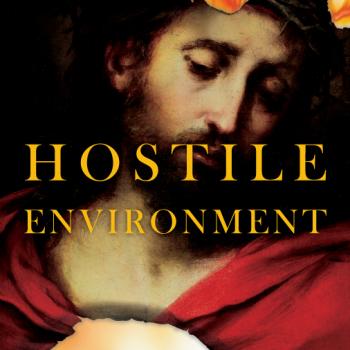As someone who writes often about Christianophobia, I often hear conservative Christians complain about increasing levels of anti-Christian hatred. I have no doubt that this represents their current perception of reality. But that does not mean that they are right. Indeed many people look at their complaints as simply the reality that Christians are no longer the dominant group in our society. Thus their perception of increased anti-Christian animosity may be simply tied to the fact that they no longer have unfair power in society.
As Christians lose relative power in society, it is possible that in the past those who hated conservative Christians may have been scared to verbalize that hatred or try to use laws to go after conservative Christian businesses or ministries. But today they do not fear Christians and can make their complaints known. There may not be any more anti-Christian hatred than in the past, but that hatred may be more public than ever. Nevertheless, whether there is an increasing level of anti-Christian hostility is an empirical question and one that I investigated in a recently available peer-reviewed article.
There are three possibilities. First, it is possible that those Christians are right and we have seen an increase in hostility towards conservative Christians. Reasons for this increase may vary, such as the increase of the nonreligious in our society or political activism from conservative Christians. Second, it is possible that those Christians are wrong and there is no increase, or possibly a decrease of hatred towards conservative Christians. Thus, conservative Christians who complain about an increase in hatred may be just playing the victim card. Third, there is not an increase in the overall level of hatred towards conservative Christians, but who has that hatred may be changing. If those who hate Christians have gained more social or political power and/or were former allies of those conservative Christians, then the experience of conservative Christians would reflect less social support. This experience may influence the complaints of conservative Christians.
To look at this issue, I used data from the American National Election Surveys (ANES) from 1980 to 2016. During the years of presidential elections, there is a thermometer question used to assess the feelings of respondents towards several social groups. Respondents were told to rate each group between 0 and 100. The meaning of those ratings were described as such:
“Ratings between 50 and 100 mean that you feel favorable and warm toward the group. Ratings between 0 and 50 mean that you don’t feel favorable toward the group and that you don’t care too much for that group. You would rate the person at the 50 mark if you don’t feel particularly warm or cold toward the group’’
So respondents were asked to indicate if they feel warmly or coldly to a group. I would interpret feeling warmly towards a group as evidence that a person likes a group and feeling coldly as evidence that they do not like a group. Since this question was used over the past thirty-six years ago to assess conservative Christian groups (either evangelicals or fundamentalists), I can see if there has been a lowering of the “thermometer” scores over that time.
There are some issues about how the groups evangelicals or fundamentalists are used in the research, but the bottom line is that we are not seeing a great deal of deterioration of warmth towards conservative Christians over the past thirty-six years. There are some fluctuations over those three and a half decades. There has been a little bit of a dropoff since 2008, but it is not enough for me to have confidence that it is not the normal movement of ratings that go on over time. Indeed in 1988 and 2000 the rankings of Christian fundamentalists were not much lower than they were in 2016. Since the thermometer questions are only asked on presidential election years, I will be interested to see if the low scores stay in 2020 and 2024. Perhaps they will even go lower. At that point I would be willing to say that we have seen an increase of anti-Christian hostility. But up to this point, I do not see that trend over the past thirty years.
The next question is who has this hostility? In my previous work on Christianophobia, I documented that white, male, wealthy, highly educated politically progressive and non-religious individuals are more likely to have anti-Christian hatred. Has it always been that way or have those with that animosity changed over time? To look at that, I used a statistical technique (OLS regression analysis) to see who is most likely to give conservative Christians a low ranking. This technique allowed me to see which variables are still important in the ranking of conservative Christians even when I control for all other variables. Generally those who rank them low were the same thirty-six years ago as they are today with one big exception. Recently income has become a significant predictor for who has emotional coolness towards conservative Christians. In 2012 and 2016 I found that those with higher incomes were ranking conservative Christians relatively low. So while those who hated Christians in the late 20th and very early 21st century were not necessarily very wealthy, this seems to be changing in our current society.
So here is my takeaway based on these findings. The overall level of hostility towards conservative Christians is not much more today than it was in the past. But those with that sort of hostility have more income than they did in the past. Since those with such income can express their hatred in more impactful ways for conservative Christians, it should not surprise us that many of them feel that there is more hostility directed towards them. Those with that hostility have much more power to do them harm.
Let me put it this way. About 20 years ago, there was hostility towards conservative Christians. But given that the profile of those with that hatred were irreligious, progressive, well-educated but relatively poor, I am thinking that we are looking at people who look a lot like graduate students. Those students had a voice but no real power (I know, I used to be one). Today you throw in the income component, and now we are looking at some of the most powerful people in our society. Their political progressiveness leads me to believe that many reside in cultural institutions such as the arts, academia and media. Powerful people in those institutions are able to change cultural attitudes, and such power definitely can contribute to perceiving oneself as facing more hostility.
Furthermore, it is a mistake to think that the expression of the power of those with Christianophobia is limited to cultural institutions. It is quite possible that many of those graduate students of a few decades ago went into business and run many of our major corporations today. This may account for the increasing likelihood of business to boycott attempts to increase religious freedom when that freedom may benefit conservative Christians. Such boycotts are also a reason why some conservative Christians feel an increase of hostility towards them over the past several years.
So while the absolute level of hostility directed at conservative Christians has not increased, the power level of those with that hatred appears to have increased. This means that those conservative Christian leaders who have been complaining about increased hatred are not completely wrong. I am only able to measure the attitudes of Americans in general and not the effects of anti-Christian hatred. Conservative Christians are more likely to feel the consequences of this hatred. If there was a way to get an objective measure of the effects of anti-Christian hatred, I would bet that the effect of that hatred has changed over the past few years. It is not simply that those who hate Christians speak up more. It is also the fact that they have the power to back up their words with harmful actions.
From the point of view of conservative Christians, it may matter less that the actual percentage of those with anti-Christian animosity has not changed than that effect of that hatred may have increased. In this way they are correct in that they experience more Christianophobia today than they have in the past even though the percentage of those with that Christianophobia has not dramatically increased. It is also worth noting that I did see a slight downtick of warmness towards Christians over the past decade or so. While I am not prepared to make an assertion about whether this downtick is indicative of a larger pattern of increasing Christianophobia, it is reasonable to suspect that this may be the case.
When powerful individuals have animosity towards a given group, it becomes quite plausible that the members of those groups will face lessening support from the rest of society. We would rightly be concerned if powerful individuals showed a great deal of antipathy towards Jews or Muslims. We should have the same level of concern that they appear to have this antipathy towards conservative Christians.
Think of it this way. If those who control the major cultural institutions in our society are becoming more likely to have Christianophobia, then we can expect a lot of anti-Christian bigotry to come out in the cultural messages they will send. Over time such cultural messages will influence those who do not yet have Christianophobia and make such religious bigotry more commonplace. I have previously documented anti-Christian academic bias, and I am currently working on a project about the biases in the media. The early results of that work also indicate evidence of bias against conservative Christians. Are we to think that what is taught in our schools and what comes out in our media will not influence the ideas of future generations?
Indeed it may have been such cultural influences that have convinced the management of companies such as the NFL, Angie’s List, Disney, Marvel and others to engage, or threaten to engage, in boycotts that take away the religious freedom of conservative Christians. One would expect such corporate leaders to have been in the sort of college classes and consume the type of media that may have been shaped by Christianophobic biases.
Thus if I am asked whether I expect more anti-Christian bigotry in the future, then my best guess is yes. Of course I guess this with incomplete knowledge. Any human guessing the future does so with incomplete knowledge. And if anti-Christian bigotry does significantly increase, it will do so among those with the greatest power in society. So my findings that anti-Christian hostility has not significantly increased over the past few decades should not be interpreted as a reason for Christians to stop being vigilant in their desire to deal with anti-Christian bigotry.











